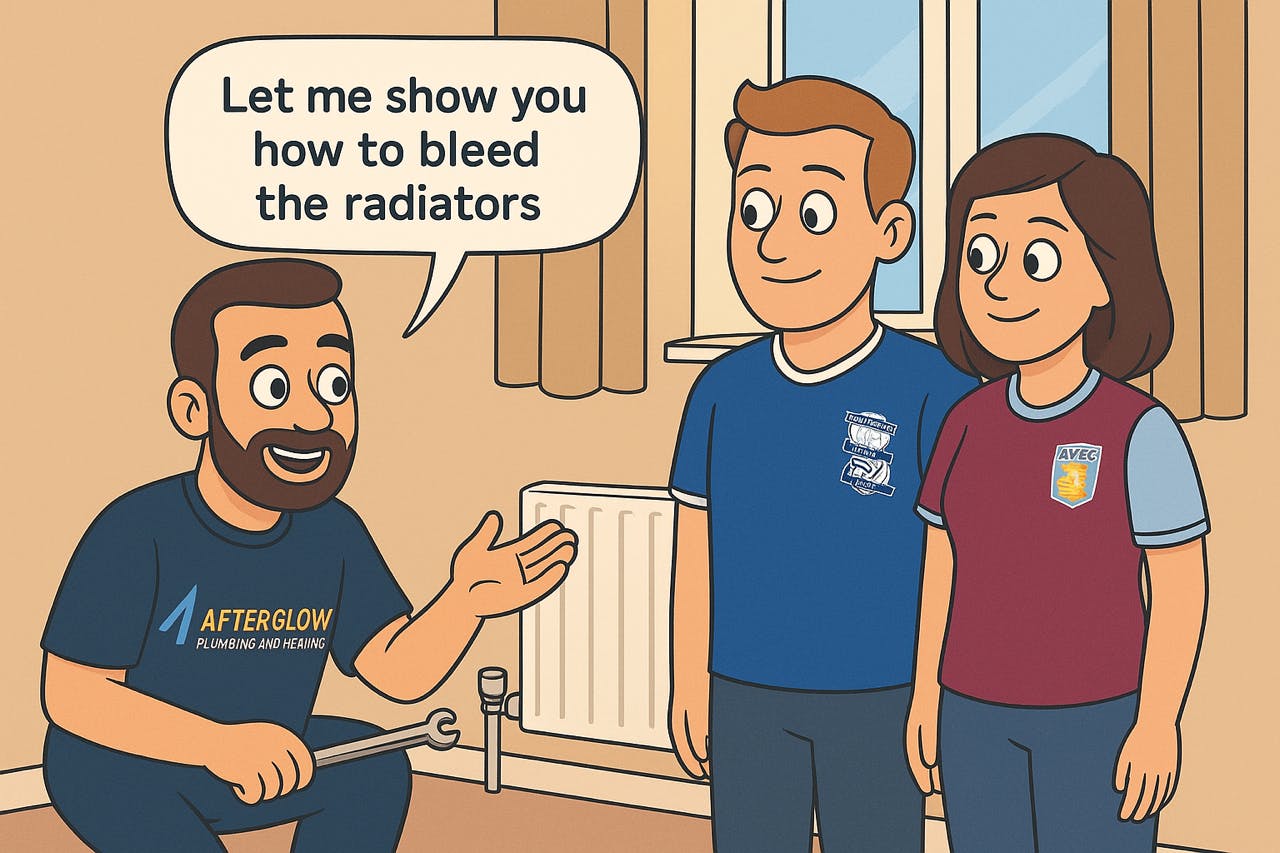How to Bleed My Radiators – A Complete Guide from Afterglow Plumbing & Heating the Birmingham central heating experts.

If your radiators are cold at the top, your rooms aren’t reaching temperature, or your central heating just isn’t running efficiently, it could be time to bleed your radiators. At Afterglow Plumbing & Heating – your trusted central heating experts in Birmingham, we’ve put together this detailed guide to help you understand the process, what to look out for, and when to call in the professionals.
Signs Your Radiators Need Bleeding
Knowing when your radiators need bleeding can save you money on heating bills and prevent damage to your boiler. Look out for these common signs:
- Cold spots at the top of the radiator – Air trapped inside prevents hot water from circulating fully.
- Rooms not getting warm – If your heating is on but the room still feels chilly, trapped air may be the culprit.
- Noisy pipes or gurgling radiators – A clear indicator that air is circulating in the system.
Step-by-Step: How to Bleed Your Radiators
- Turn off your heating – Let radiators cool so you don’t get scalded.
- Find the bleed valve – Usually at the top corner of the radiator. You’ll need a radiator key (or in some cases, a flat-head screwdriver).
- Use a cloth and a container – Hold a towel or jug underneath the valve to catch water.
- Turn the valve slowly – Anti-clockwise, about a quarter of a turn, until you hear air hissing.
- Wait until water appears – Once water (without spluttering air) flows steadily, close the valve.
- Repeat on other radiators – Start with those furthest from the boiler and work closer.
- Check your boiler pressure – Bleeding can reduce system pressure.
Things to Watch Out For When Bleeding
- Very dirty water – If black or sludgy water comes out, your heating system may need a power flush to remove built-up sludge.
- Frequent need to bleed radiators – Regular air build-up can indicate a bigger issue, like corrosion or a system leak.
- Low pressure afterwards – Always check and top up your boiler pressure if needed.
Sludge and Boiler Damage
Over time, rust and corrosion inside pipes form sludge, which:
- Blocks radiators so they don’t heat evenly.
- Causes strain on pumps, valves, and heat exchangers in your boiler.
- Leads to costly breakdowns if left untreated.
At Afterglow, we specialise in boiler repairs and central heating power flushing in Birmingham, restoring systems to peak efficiency.
Topping Up Boiler Pressure
If you have a sealed central heating system, you’ll need to keep an eye on boiler pressure. Most boilers work best between 1.0 and 1.5 bar.
External Filling Loop
- A flexible braided hose usually found beneath the boiler.
- To use it: open both valves slowly until the gauge reaches the correct pressure, then close them securely.
Internal Filling Loop
- Some modern boilers have a built-in filling mechanism.
- Look for a lever or small tap beneath the boiler, often behind a panel.
Systems Fed by a Tank in the loft.
- Older systems use a feed and expansion tank in the loft.
- These refill automatically and don’t require manual topping up.
Why Air Builds Up in Your System
- Rust reaction inside radiators produces methane and hydrogen gas, which can lead to trapped air.
- If you’re constantly topping up boiler pressure, it may be a sign of a leak in the system that needs professional repair.
Why Choose Afterglow Plumbing & Heating in Birmingham?
We are central heating experts and boiler repair specialists in Birmingham, with years of experience servicing boilers, repairing leaks, and flushing heating systems.
Get Your Heating System Running Efficiently Again
If you notice cold radiators, dirty water, or are constantly topping up your boiler pressure, don’t ignore the problem. Call Afterglow Plumbing & Heating – the boiler repair and central heating experts in Birmingham. We’ll service your boiler, flush your heating system, and make sure your home stays warm and efficient.
Frequently Asked Questions on Bleeding Radiators
1. How do I know if my radiators need bleeding?
If your radiator is cold at the top but warm at the bottom, makes gurgling noises, or if rooms aren’t heating up properly, it’s a clear sign that trapped air needs to be released.
2. How often should I bleed my radiators?
Most homes only need their radiators bled once or twice a year, usually before the colder months. However, if you notice cold spots or noisy radiators, you may need to bleed them sooner.
3. Do I need to turn my heating off before bleeding radiators?
Yes. Always switch off your heating and allow radiators to cool before bleeding. This keeps the process safe and prevents hot water from causing injury.
4. What tools do I need to bleed a radiator?
You’ll need a radiator bleed key (available at most DIY stores), and a cloth or small container to catch any water that escapes.
5. What happens if dirty water comes out of my radiator?
If black, sludgy, or very dirty water comes out, it’s a sign your heating system may need a power flush. Sludge build-up can damage your boiler and reduce efficiency.
6. Will bleeding my radiators affect my boiler pressure?
Yes, bleeding radiators can lower the pressure in sealed central heating systems. Always check your boiler’s pressure gauge afterwards. If it’s too low, you’ll need to top it up using the filling loop.
7. What’s a filling loop and how does it work?
A filling loop is a small flexible hose used to add water into a sealed heating system to raise boiler pressure. Some boilers have external filling loops, while others have internal ones built in.
8. Do I need to bleed all radiators in the house?
Yes, for best results. Start with the radiator furthest away from your boiler and work your way closer.
9. Why does air keep getting into my radiators?
This could be due to rust inside the system (which produces gases like hydrogen), or a leak somewhere in the pipework. If you find yourself bleeding radiators and topping up boiler pressure often, you should get your system checked by a heating engineer.
10. Can Afterglow Plumbing & Heating help if I keep having problems?
Absolutely. We are central heating and boiler repair experts in Birmingham. Our engineers can flush your system, repair leaks, service your boiler, and get everything running efficiently again.



